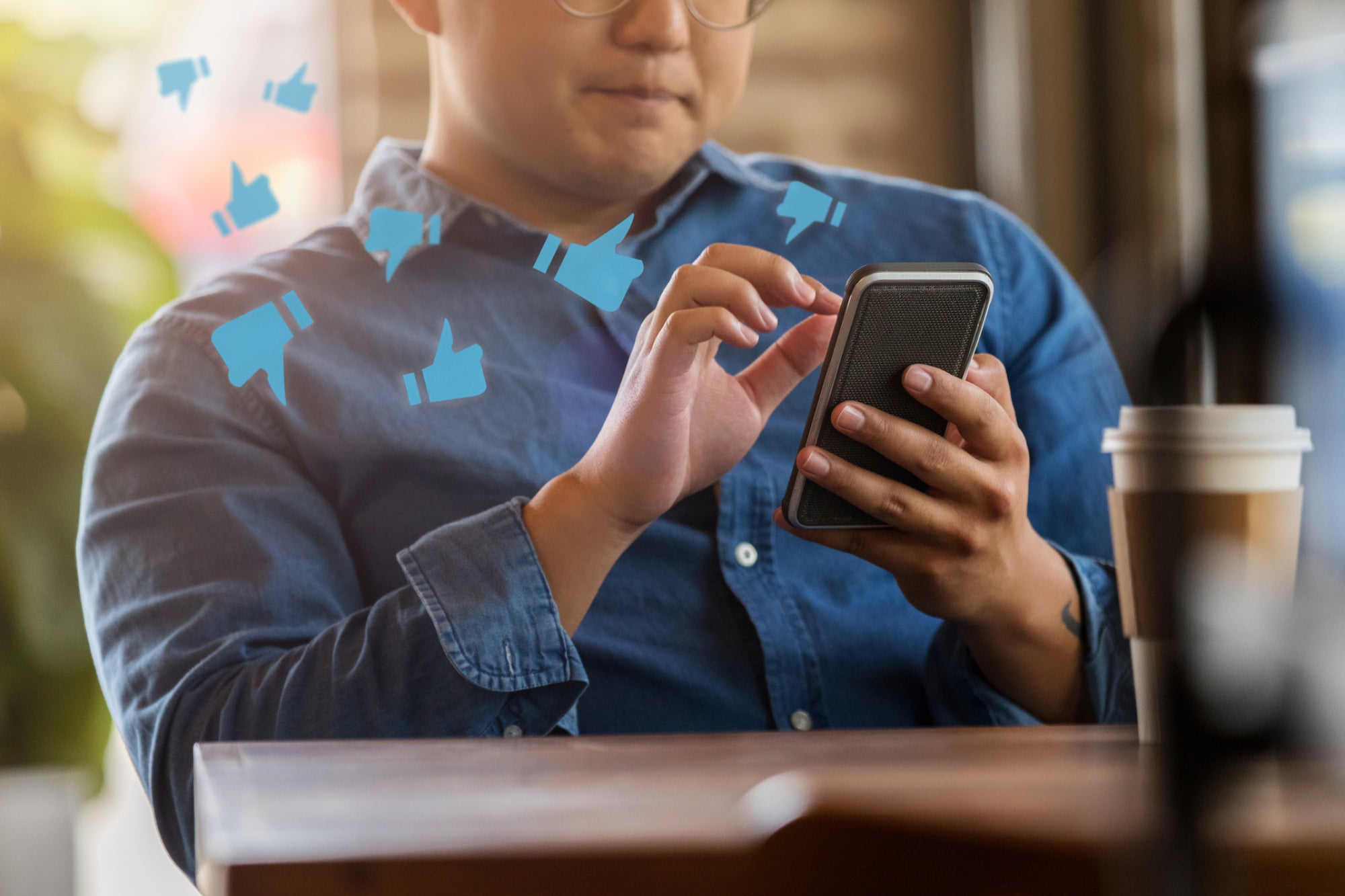How Entrepreneurs Can Harness The Power of Social Media for Good Technology doesn't harm, but your uneducated relationship with tech does. Here is how entrepreneurs can use social media to their advantage.
By Aytekin Tank Edited by Frances Dodds
Opinions expressed by Entrepreneur contributors are their own.

"Is there a problem and what is the problem?" a narrator asks his subjects, as they stare off into the distance against an ominous score. Some clear their throats, while others stumble with words or offer half-smiles in response.
You get the sense that something both sinister and monumental is about to be revealed on the screen.
Like everyone else, I began watching the recent Netflix docudrama film, The Social Dilemma with eager anticipation. Most of my friends and colleagues had recommended it to me over the past few weeks, and I finally set some time aside to view what had received so many mixed reviews.
In the film, you see former employees of Google, Facebook, Twitter, and other similarly large platforms, speak about the negative impact of tech giants on our behaviors. It's a darkly entertaining documentary that hooks you with its sensationalist play-acting — using dramatized segments and even a villainous algorithm to drive home its point.
Related: 9 Ways to Rewire Your Brain for Creativity
It's meant as a cautionary tale about how social media is eating at the foundations of society, yet halfway through, it felt like I was watching just another episode of Black Mirror, rather than a nuanced take about our modern condition.
By the end, I felt both drained and demoralized. Not because I bought into the distorted view that these platforms are pure evil. But because despite all the hoopla surrounding the film, it ended up being a simplistic assessment used to stoke more fear and outrage.
While some loved it, many criticized the docudrama for showing technology as if it's a completely bad thing.
Here's the thing: it's not.
"The Social Dilemma discounts the notion of using social networks creatively or critically, sometimes to the point of condescension," writes Adi Robertson in a story for The Verge. "But it's easy to find people thoughtfully engaging with these apps, particularly amid the COVID-19 pandemic, which has turned screens into some of the only safe public spaces."
As CEO of a tech company, I feel a personal responsibility to clarify what in my opinion, the film gets wrong:
Technology doesn't harm, but your uneducated relationship with tech does
Fourteen years ago when I launched my startup JotForm, I relied on the same idea most business owners hold — that execution is everything.
Today, it's clear to me that while this remains true, as an entrepreneur, I also need to stay in the loop of what's happening in my industry. But this level of learning doesn't just happen by reading books.
So much wisdom and useful knowledge are being created on Twitter, blogs, and newsletters.
It's easy to criticize social media platforms, but this misleading "tech is bad" approach misses the point, eventually destroying our ability to benefit from the useful knowledge to be gained. And this logic applies to benefiting from any network.
Related: Ways in Which Technology is Affecting the Youth Today
Take Twitter. If you don't get value from Twitter you're using it wrong. The site has been an excellent resource for inspiration and for finding other entrepreneurs from around the world who share their insights, tools, and strategies. It also allows us to engage with customers in a way we couldn't replicate offline.
Let me offer an alternative view to what The Social Dilemma poses.
Tech giants aren't ruining society. But our untamed, unmitigated relationship to tech is.
Allowing our every minute to get sucked into a never ending loop of distraction is simply unhealthy.
So, what am I advocating for?
Rather than spend our time blaming social media for all of society's ills, it's on us to disrupt this cycle and find a responsible way to reclaim our attention.
Here are three strategies for taking a healthier approach to social networks:
1. Become the master of your devices
According to Harvard Business Review contributor Steve Glaveski, push-notifications are sapping our ability to get into flow and do our best work, but "You can be more intentional about the way you design your technology environment," he writes.
In other words: the ability to control our minds starts with us.
We get to decide how we educate ourselves and restore our time.
For instance, a free tool like Mailbrew helps you receive all the tweets or newsletters you don't want to miss in your inbox at a time YOU decide. Similarly, you can also use the Freedom App to block distracting websites and apps (such as social media) for specific periods of the day. "The more you notice and stop yourself from reaching for your smartphone, the more it will become second nature," Glaveski notes.
So, instead of being a slave to push notifications, you can use these tools to empower yourself without missing the wise advantages of social platforms.
2. Eliminate an "always on" company culture
Disrupting an unhealthy relationship to tech begins with us, but it doesn't end there. Entrepreneurs should be setting this example for their team by promoting a balanced workplace. Meaning: the change starts at the level of leadership.
We do this by clearly delineating the parameters between our "on" and "off" hours, and communicating that it's okay to not respond to things immediately. At JotForm, this has become one of the core tenets of how I want to run my business. It's important that I foster a culture where we have strict boundaries in place for screen time and prioritize mental well being.
3. An antidote to our social dilemma? Periodically unplug
My staff often poke fun of me for being the spokesperson for alone time. It's an inside joke I'm proud to own up to and widely encourage.
I can't stress enough how necessary periodically unplugging is. "Solitude is an essential way to replenish our energy," says psychotherapist Arnie Kozak in an interview with NBC Better. "Without such solitude, we are bound to be more stressed by the unrelenting busyness of life, the massive amounts of information we wade through every day, and the energetic demands of being around other people."
The answer then to The Social Dilemma's question: "Is there a problem and what is the problem?" isn't in breaking up with our social media (and consequently, all the beneficial wisdom).
If I've learned anything in over a decade of entrepreneurship, it's this: educating ourselves to spend more quality time alone without our devices is one of the most essential ways to maintain a healthy connection to tech.
But perhaps Glaveski puts it best: "By being more intentional about our relationship with technology, we can cultivate a work environment in which we are not only more productive, but also more fulfilled and actualized versions of ourselves."
Related: As TikTok Teeters, These 3 Social Networks Are Ready to Pounce










